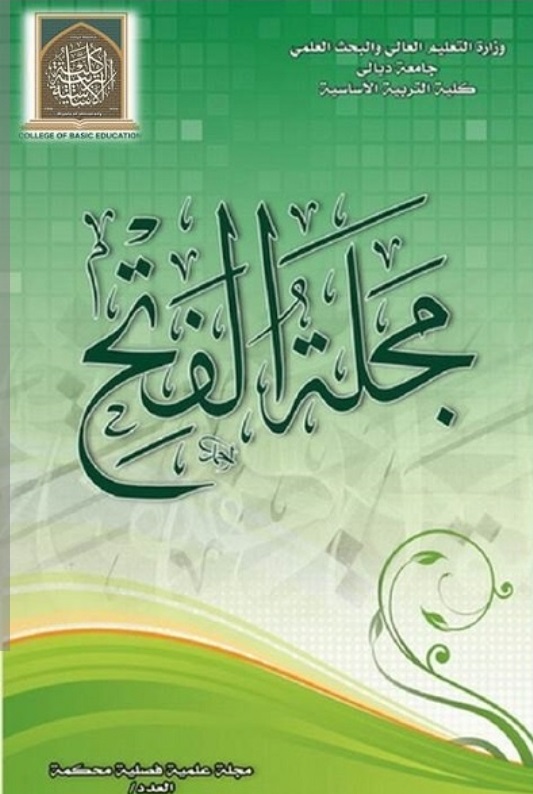Creating Self-challenge among university students
DOI:
https://doi.org/10.23813/FA/29/2/18Keywords:
Self-challenge- the theory- MotivesAbstract
The research aims to identify:
- The level of self-challenge among university students.
- The significance of the differences in creating self-challenge
Research community: The research community consists of students of the University of Diyala of both genders (males, females) and specialization (scientific, humanities) from the morning undergraduate students for the academic year (2024-2025), as it reached (20226) male and female students distributed according to specialization and gender. The number of male students in the scientific specialization reached (4154) students and the number of female students in the scientific specialization (4871) female students. As for the humanities specialization for males, it reached (4042) students, while the number of females in the humanities specialization reached (7159) female students. This research community includes all the apparent terms that it studies.
Research sample: The researcher uses a sample because it is complex to study the entire population (Al-Kubaisi, 2007: 217). It is the group on which data is collected in the study, and which is chosen from the study population to represent that population in the research being studied.
Research tools: To achieve the research objectives, the researcher constructed a self-challenge scale (according to the Self-Challenge Theory 2022) that included (21) paragraphs. Its validity and reliability were extracted and applied to a sample of (200) male and female students who were selected randomly from university students for morning studies for the academic year (2024-2025) distributed equally according to the gender variable, and from both specializations (humanities - scientific). Constructive validity and apparent validity were verified, as well as the stability of the scale by two retest methods. The reliability coefficient reached (0.90), while the tool's reliability coefficient by Cronbach's alpha method reached (0.91). By using the statistical package (SPSS), as statistical means to reach the results: It was found that university students enjoy self-challenge and there are statistically significant differences in measuring self-challenge according to the gender variables (males, females). In light of the research results, a number of recommendations and proposals were made.
- University students have a self-challenge.
- There are statistically significant differences in the level of self-challenge according to the variables of gender and in favor of females, and there are no statistically significant differences according to specialization. In continuation of the aspects related to the research, the research came out with some suggestions, recommendations and conclusions, as self-challenge exists among the research sample. The results showed that there were differences in self-challenge among the research sample according to the gender variable and in favor of females.
References
المصادر والمراجع
-ابو بكر, مختار (2016), اسس ومناهج البحث العلمي, الطبعة الاولى, نيو ليك الدولية للنشر والتدريب.
- الامين،محمد (2023) التحدي الذاتي،ط1.
- بنار، حيدر (2023) مفهوم التحفيز الذاتي في الإسلام .
- سامي ،محمد امين (2022) تحدي التعلم الذاتي (مقال للدكتور إدريس أوهلال).
-عبد الرحمن, محمد السيد (2003), علم النفس الاجتماعي المعاصر مدخل معرفي, القاهرة, دار الفكر العربي.
ترجمة المصادر والمراجع العربية :Arabic sources
Abu Bakr, Mukhtar (2016), Foundations and Methods of Scientific Research, first edition, New Lake International for Publishing and Training.
Abdul Rahman, Muhammad Al-Sayed (2003), Contemporary Social Psychology, A Cognitive Introduction, Cairo, Dar Al-Fikr Al-Arabi.
Banar, Haider (2023) The concept of self-motivation in Islam.
Sami, Muhammad Amin (2022) The Challenge of Self-Learning (Article by Dr. Idris Ohlal).
Alameen, Mohammed (2023) , Self challenge ,first edition.
المصادر والمراجع الاجنبية: References
Baumeister، R.؛ Leary، M. R. (1995). "The need to belong: Desire for interpersonal attachments as a fundamental human motivation". Psychological Bulletin. DOI:10.1037/0033-2909.117.3.497. PMID:7777651.
Chirkov، V.؛ Ryan، R. M.؛ Kim، Y.؛ Kaplan، U. (2003). "Differentiating autonomy from individualism and independence: A self-determination perspective on internalisation of cultural orientations, gender and well being". Journal of Personality and Social Psychology.
Deci, E., & Ryan, R. (Eds.), (2002). Handbook of self-determination research. Rochester, NY: University of Rochester Press.
Deci, E. L. (1975). Intrinsic motivation. New York: Plenum.
Deci، E. L.؛ Eghrari، H.؛ Patrick، B. C.؛ Leone، D. R. (1994). "Facilitating internalization: The self-determination theory perspective". Journal of Personality. DOI:10.1111/j.1467-6494.1994.tb00797.x. PMID:8169757.
Deci، E. L.؛ Vansteenkiste، M. (2004). "Self-determination theory and basic need satisfaction: Understanding human development in positive psychology". Ricerche di Psichologia.
Deci, E. L., & Ryan, R. M. (1985). Intrinsic motivation and self-determination in human behaviour. New York: Plenum.
deCharms, R. (1968). Personal causation. New York: Academic Press.
Harter، S (1978). "Effectance motivation reconsidered: Toward a developmental model". Human Development.
Nunnally, G, C , (1978) ; psychometric theory, New york, mccraw- Hil
Reeve, J. (1996). Motivating others. Needham Heights, MA: Allyn & Bacon.
Ryan، R. M.؛ Deci، E. L. (2000). "Self-determination theory and the facilitation of intrinsic motivation, social development, and well-being". American Psychologist. -CiteSeerX:10.1.1.529.4370. DOI:10.1037/0003-066x.55.1.68.
Vallerand، R. J.؛ Reid، G. (1984). "On the causal effects of perceived competence on intrinsic motivation: A test of cognitive evaluation theory". Journal of Sport Psychology.–. DOI:10.1123/jsp.6.1.94.
Vallerand, R. J. (1997). Toward a hierarchical model of intrinsic and extrinsic motivation. In M. P. Zanna (Ed.), Advances in experimental social psychology (Vol. 29, pp. 271–360). San Diego, CA: Academic Press.
White، R. W. (1959). "Motivation reconsidered: The concept of competence". Psychological Review.
White, R. W. (1963). Ego and reality in psychoanalytic theory. New York: International Universities Press.
Downloads
Published
How to Cite
Issue
Section
License
Copyright (c) 2025 https://creativecommons.org/licenses/by/4.0/

This work is licensed under a Creative Commons Attribution 4.0 International License.
حقوق النشر والترخيص
تطبق مجلة الفتح للبحوث التربوية والنفسية ترخيص CC BY (ترخيص Creative Commons Attribution 4.0 International). يسمح هذا الترخيص للمؤلفين بالاحتفاظ بملكية حقوق الطبع والنشر لأوراقهم. لكن هذا الترخيص يسمح لأي مستخدم بتنزيل المقالة وطباعتها واستخراجها وإعادة استخدامها وأرشفتها وتوزيعها ، طالما تم منح الائتمان المناسب للمؤلفين ومصدر العمل. يضمن الترخيص أن المقالة ستكون متاحة على نطاق واسع بقدر الإمكان وأن المقالة يمكن تضمينها في أي أرشيف علمي.
لمزيد من المعلومات، يرجى متابعة الرابط: https://creativecommons.org/licenses/by/4.0/.



